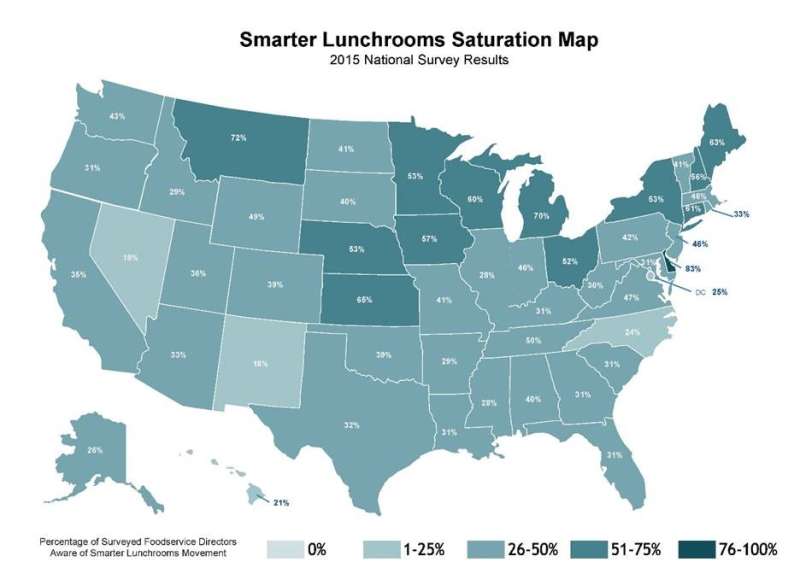Smarter lunchrooms innovators

School food service directors are the gatekeepers of child nutrition for over 30 million students nationwide, thus having a tremendous opportunity to help instill healthy eating habits among our youth through the no-cost or low-cost changes championed by the Smarter Lunchrooms Movement (SLM).
So, what is the best way to empower food service directors to make these changes? A new study from the Cornell Center for Behavioral Economics in Child Nutrition Programs (BEN Center), the home of SLM, finds that a key component in adoption is whether food service directors have opportunities for career development.
"This study gave us great insights into what sets 'school meal innovators' apart," explains co-author David Just, PhD, Professor and co-founder of SLM, "more than any other factor, access to membership in professional organizations and career development opportunities empower individuals to make positive Smarter Lunchrooms changes in their cafeterias."
The study surveyed 8,143 food service directors across the country and found that the average food service director was female with over a decade of job experience and was aware of some strategies for making healthy changes in school meal programs. Of the respondents 22% were aware of SLM. Those food service directors who were involved in professional organizations and/or participated in trainings or seminars were much more likely to be aware of SLM, and more likely to implement healthy changes in the school cafeteria.
"Food service directors have to balance budgets and national or state regulations with students' nutrition. Tools like the Smarter Lunchrooms Movement exist to help them do this," David Just concludes, "The best way to make the leap from awareness to practice is to provide funding and support for food service directors to be involved in professional organizations and participate in trainings and seminars."
This self-funded research is published in Evaluation and Program Planning and is authored by Gnel Gabrielyan, PhD, Cornell BEN Center; Andrew Hanks, PhD, Ohio State University; Kathryn Hoy, MDN, RD, CDN, Doctoral Student at University of South Carolina, and co-directors of the Cornell BEN Center David Just, PhD, and Brian Wansink, PhD.
What is the Smarter Lunchrooms Movement?
SLM is a grassroots movement based on behavioral economics, psychology and marketing that champions low-cost/no-cost changes to the lunch line and cafeteria that make healthy foods, such as fruits and vegetables, more attractive and convenient to students. In turn, SLM research-based changes make students more likely to select and consume healthy foods, meeting daily nutrition needs and potentially developing lifelong healthy eating habits. SLM also helps school meal programs increase participation and maintain revenue.
More information: Gnel Gabrielyan et al, Who's Adopting the Smarter Lunchroom Approach? Individual Characteristics of Innovative Food Service Directors, Evaluation and Program Planning (2016). DOI: 10.1016/j.evalprogplan.2016.08.023
















